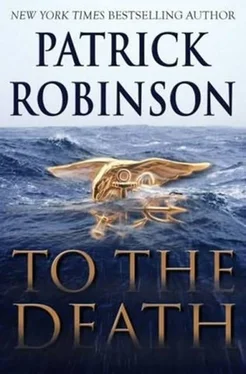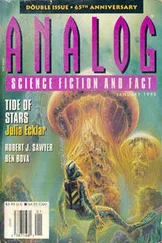They had lunch at the embassy, where the cooks were under orders always to produce food that reminded the ambassador of the desert and the culture of the northern end of the Arabian Peninsula. Thus lunch when it arrived was chicken kebabs, rice, houmus, and salad.
They sipped fruit juice and then sat in the opulent rear drawing room. They read the newspapers, and Ravi watched the King George VI and Queen Elizabeth Stakes at Ascot, won for the umpteenth time by the Irish with a superb dark bay colt sired by the Coolmore-based champion stallion, Galileo.
Shakira, who had been paying scant attention, suddenly heard the word “Coolmore” and almost jumped out of her chair. “I’ve been there!” she exclaimed.
“Where? Ascot?” asked Ravi.
“No, Coolmore,” she said. “I visited it while I was waiting for you in Ireland.”
“Did you see the great Galileo? That horse who just won was his son.”
“Well, I didn’t actually go in, but I saw the big iron gates, and I saw all the green countryside where the horses live. It’s in Tipperary.”
Ravi, of course, like anyone with the remotest knowledge of horse racing, knew all about Coolmore. He grinned at Shakira and asked, “How on earth did you find your way down there?”
“I met a man in the hotel in Dublin who owned a filly foal. I think she was born there,” she replied, accurately. “And it was very important to him that her brother, called Easter Rebel, would win the Irish Stakes or something.”
“The what?”
“The Irish something. I can’t remember. But it mattered to him.”
“That would have been the first week in July. It was probably the Irish Derby.”
“ Derby, that’s it. He wanted Easter Rebel to win the Irish Derby.”
“And did he?”
“I forgot to find out.”
Ravi laughed. “I’m not sure you’ve mastered an in-depth appreciation of horse racing,” he said. “Otherwise, you’d have remembered to find out what happened to Easter Rebel.”
“I’ll tell you what I do remember,” she retorted. “Easter Rebel was also the son of that telescope man-what’s his name, Galileo.”
“Was he? Well, you ought to know whether the Rebel won and made your new friend rich.”
“How can I find out?”
“I’ll do that for you. If I can use that laptop computer over there on the sideboard.”
Ravi walked over and opened it. He searched with Google and found a site for the Racing Post. Then he tapped in the name “Easter Rebel” and, nine seconds later, learned that the colt had not won the Irish Derby, but had been beaten by a head in a photo finish.
“Just lost,” he told Shakira. And he made a signal with his right hand, placing his index finger about a quarter of an inch above his thumb. “That much,” he added.
“Poor Mr. O’Donnell will be very sad,” she said.
“I assure you he won’t,” said Ravi. “I expect he’s going to sell his filly, and most breeders would be happy going through the ring with a sister to a colt beaten by a head in the Irish Derby. Don’t feel sorry for him.”
“Okay, I won’t.”
“Was his filly also by Galileo?”
“Can’t remember,” she said absently, leafing through her fashion magazine.
Life and death for Mr. O’Donnell, total lack of interest by Shakira. Ravi smiled and thought of his father, the man the newspapers always referred to as the “shipping tycoon and racehorse breeder.”
He missed seeing his family but was certain that they now knew what he had done and what disgrace he had brought upon them all. Treason, mutiny, murder. My God! He hardly dared to think about it.
Toward the end of the afternoon, Ravi retired to his embassy suite, leaving Shakira to watch a sitcom on the television. He opened the leather case and started counting. Carefully he took out the sections of the rifle, assembling them into the finely engineered finished product.
Then he started his count again, disassembled the weapon, and placed the pieces back in the case. It had taken him twenty-eight seconds to put it together and twenty-four seconds to take it apart. The twenty-eight did not matter, but the twenty-four was critical and it was too long. From the moment he fired that lethal 7.62mm shell at the admiral’s unprotected head, every second counted. Because right then he would be in the critical part of the operation, the getaway.
Twenty-four seconds was almost a half minute. There would be, he knew, American Secret Service agents, London police security, and possibly military personnel swarming outside the Ritz. If they had even an inkling of where the bullet had come from, they would be across Piccadilly in fifteen seconds and into the building where his office was situated. If they were through those glass doors before he was out, he’d be trapped, overwhelmed, and headed for the gallows on charges of murder and high treason against Her Majesty’s forces.
That twenty-four seconds had to be reduced, and if it couldn’t, he might have to abort the mission. But Ravi knew it could. Over and over, he assembled the rifle and then disassembled it. For almost two hours he practiced, finally realizing that the principal solutions to the operation were the swift removal of the telescopic sight and the level of tightness on the wide silver-plated finger screw which attached the stock to the neck.
After another hour, he could disassemble that sniper rifle in eighteen seconds. Within two hours, he had it down to twelve, and those twelve seconds would be all he could afford while packing the rifle away and bolting down the stairs to the freedom of Dover Street.
Early that evening, before dinner with the ambassador, Ravi went shopping alone. He walked through to Knightsbridge and wandered into Harrods, to the busy ground-floor men’s department where once he had shopped with his mother, purchasing a new tweed jacket for school. Today he wanted a new dark gray suit, a blazer, a few shirts, a couple of ties, boxer shorts, socks, and shoes.
It took him forty-five minutes to punch a serious hole in £2,500, and he paid with his Amex card, which would eventually be billed to the government of Jordan via the Paris embassy. He then made his way to men’s sporting goods and purchased a loose-fitting tracksuit and a medium-sized athlete’s duffel bag.
Casting aside the green Harrods plastic shopping bags, he folded his purchases neatly into the sports bag and walked back to the embassy via Sloane Street and Cadogan Place. He and Shakira dined with the ambassador that evening, in company with two visiting Saudi sheiks.
The following morning, Sunday, July 29, the day before Admiral and Mrs. Morgan were due to board the London flight from Washington, D.C., Ravi summoned the Audi from the Motcombe Street garage and asked one of the embassy staff to fill the tank, because he and Shakira were going on a journey of almost 150 miles.
They left at around 11 A.M., both dressed casually in jeans and sneakers, Shakira wearing a blue shirt and denim jacket, Ravi in his black T-shirt and suede jacket. This was his Irish killing gear, although he did not anticipate murdering anyone today. Indeed, he did not expect to meet, or speak to, one other member of the human race all day.
They once more drove west, but not on the gloomy old A-4 under the Chiswick flyover. This time they sped straight over the top and out onto the wide, fast M-4 motorway. They drove past Heathrow and proceeded for almost an hour to where the landscape begins to rise into the foothills of the Berkshire Downs.
They left the M-4 at Junction 13 and headed north up the A-34 toward Oxford, finally branching left to the switchback road that leads to the village of West Ilsley. This is land where all villages seem to lie in the folds in the Downs, invisible until you are actually in them.
Читать дальше












